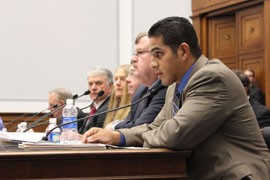Cronkite News has moved to a new home at cronkitenews.azpbs.org. Use this site to search archives from 2011 to May 2015. You can search the new site for current stories.
Slow-moving regulation hurting builders of manufactured homes
WASHINGTON – The director of engineering for a Phoenix-based manufactured-home company told congressional lawmakers Wednesday that a federal agency’s inefficient handling of regulations has contributed to an 80 percent drop in construction in his industry since 2000.
Manuel Santana of Cavco Industries testified that the Department of Housing and Urban Development’s interpretation and implementation of the Manufactured Housing Improvement Act of 2000 has been poor and slow to adapt to changes in the industry.
“Due to the inability of the HUD Code to keep pace with these practices, it often takes months to receive the required HUD approval of these non-standard designs,” Santana said in remarks prepared for the House Committee on Financial Services Subcommittee on Insurance, Housing and Community Opportunity.
“These delays result in lost sales and unnecessary interruptions in the construction process, which ultimately lead to loss of jobs and lost economic opportunity for the industry,” said Santana, who was testifying on behalf of the Manufactured Housing Institute.
Santana, who testified with four other industry or homeowners’ representatives, said he has no problems with the act that was passed last decade. He said the problem is “the way that the standard is revised, the time that it takes, and the obstacles that there are to improve it.”
But the sole HUD official at the hearing testified that the agency actively listens to all stakeholders to ensure manufactured housing continues to be affordable and a value option for homebuyers.
“I want to assure the subcommittee that the department has and continues to fairly and diligently implement the 2000 act in accordance with the statutory purposes to protect the quality, durability, safety and affordability of manufactured housing,” said Henry Czauski, the acting deputy administrator for HUD’s Office of Manufactured Housing Programs.
Santana said the Manufactured Housing Institute has made dozens of recommendations to improve HUD’s code since its adoption in 2000, but most of those updates await final action by HUD. He also said an advisory committee has recommended three comprehensive updates of the code but that only one, in 2005, has been adopted by HUD.
Santana said HUD’s inefficiency has added to problems for an industry that is already reeling from a lack of financing for homebuyers and the uncertainty and impact of new financial services and regulations. Altogether, these challenges have forced the industry to close 160 plants and lose more than 200,000 jobs nationwide over the past decade, he said.
“Without action in these key areas, the people who live in manufactured homes and whose livelihood is connected to this industry are at significant risk,” he said.
Phoenix-based Cavco employs more than 2,500 people at 15 plants around the country, Santana said in his testimony. He said the company, which sells under several different brand names, is the nation’s second-largest producer of manufactured housing.







